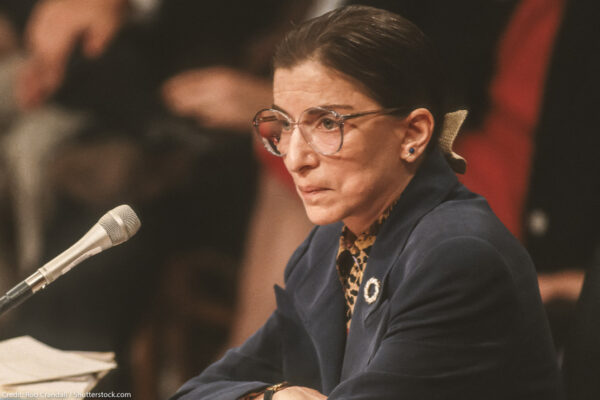Ruth Bader Ginsburg recognized that dismantling patriarchy was necessary not only for women’s liberation, but for all of us to have the freedom to thrive regardless of gender. That certainty drove her strategy during the eight years she spent as director of the ACLU Women’s Rights Project, which she co-founded with Brenda Feigen in 1972.
No case better encapsulated Ginsburg’s strategy in the 1970s than that of Charles Moritz. Moritz was solely responsible for the care of his elderly mother, but he had been denied a caregiving tax deduction because he was an unmarried man. By representing him, Ginsburg was able to show male judges that sex discrimination hurt men as well as women. And, because the case originated in tax court, it allowed Ginsburg and her beloved husband Marty, a tax specialist, to collaborate on work as well as life.
The government’s defense in the case backfired spectacularly. It pointed to a hefty list of federal statutes that, like the one that disadvantaged Moritz, expressly distinguished between women and men. Ginsburg couldn’t possibly be right about the tax law, argued the government, because if she was, then hundreds if not thousands of other laws would be unconstitutional, too. Ginsburg prevailed, and the list – known as “Appendix E” – became WRP’s playbook as Ginsburg and her colleagues systematically took aim at laws that discriminated on the basis of sex.
While Ginsburg succeeded in establishing that the government could not condition benefits on sex, the private sector has been slow to catch up. In recent years, WRP has challenged employer policies premised on the generalization that women are the primary caregivers at home and has fought for men and women to be entitled equally to benefits like parental leave to care for newborn children. Men’s full participation in early days of parenting can lead to more equitable family roles over the long haul.
Ginsburg knew that, in order for women to step out of caregiving roles, men would have to step into them. That’s not to say that Ginsburg prioritized work outside the home over work within it. To the contrary, it was her fervent hope that everyone could share equally in the joys and labor of family life.
I had the opportunity to interview Justice Ginsburg in what turned out to be one of her final public appearances. Knowing that she had often been asked how she balanced her own career with parenting, I wondered whether anyone had ever asked her husband about how he achieved work-life balance. Unfortunately, Marty wasn’t there to speak for himself, having died a decade earlier. Instead, I asked Ginsburg what advice she would give to men who are working and parenting. “One of the saddest things about men’s lives is that they’re out there working,” she answered, “and one day their children are grown and they didn’t have any real part in raising them.”
I remembered Ginsburg’s remarks in that moment on Friday evening when we learned, as the sky went dark and a new year began according to the Jewish calendar, that she had died. Just as childhood is fleeting, so too she had left us too soon. We at the ACLU will use each day to carry forward her legacy.
Note: This piece was originally published in SCOTUSblog on Sept. 21, 2020

